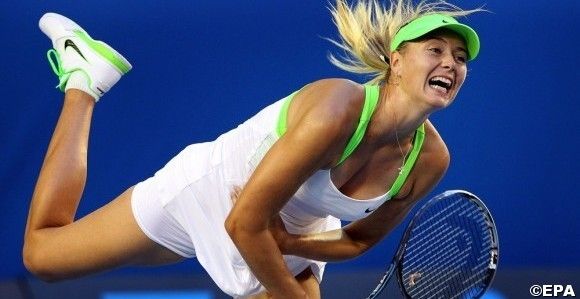Some Progress is Being Made About Grunting on Court
In terms of Maria Sharapova’s audibility of the first day of Wimbledon, her grunting can, and almost certainly will, get a lot louder. However, after long promising to the address the ‘on court noise’ issue, the WTA has come to an agreement with both the Grand Slam Committee and the International Tennis Federation to develop what the British tabloid newspapers once termed a ‘gruntometer.’
WTA chief executive Stacey Allaster, mindful of the fuss created in the down market Wimbledon press 20 years ago when Monica Seles noisily made her way to the Ladies final insisted: “I’m not going to use that name.”
But she agreed: “It’s time for us to drive excessive grunting out of the game for future generations.” So, with the tennis rule makers determined to pass new legislation that sets a limit for the amount of noise produced by players, Allaster has committed the WTA to develop a monitoring device that can be attached to umpires chair or even hand-held and be triggered when grunting becomes excessive.
However Allaster was at pains to point out that current day grunters, like world no.1 Sharapova, no.2 Victoria Azarenka and any other current player who have never been reprimanded or penalized for the noise they make on court and were initially coached to include grunting into their technique, would not be affected by any new rules.
Allaster, who last year at the WTA Championships in Istanbul promised measures would be taken, said: “The bottom line is that we want to bring forward across all levels of competition an objective rule through use of technology to make it much easier for athletes and chair umpires.”
At the time she commissioned research to be made and questions to be asked of leading players. It is understood that Serena and Venus Williams, who would both figure in the top ten of grunters, were interviewed to give their thoughts.
Allaster reported: “What is clear from experts is that it would have a clear, damaging effect on performance of the existing generation. It’s going to take some time. I don’t want to get ahead of ourselves because it’s a collective effort of the sport and we need everyone to buy in.”
Although the ITF’s current Rules of Tennis, do include the Hindrance Rule, it is largely redundant because women players admit they don’t want to be the first to complain if their opponent exceeds noise levels Allaster. “What is too loud or what is too long?” asked Allaster. “We need to give the official an objective measurement tool. Can you imagine on a critical point an umpire going, ‘Oh, I thought you were too loud.’ You have to take all of that out of the equation. It’s not fair to athletes, the chair or the sport.”


10sBalls Top Stories
- Bahis Sitelerinin Deneme Bonusu Kullanım Şartları
- Deneme Bonusları ile Ücretsiz Bahis Nasıl Yapılır?
- Cazip Hoş Geldin Bonusları ile Üyelik Avantajları
- Bahis Siteleri ve İlk Üyelik Bonusu Detayları
- Yeni Üyeler İçin En Cazip Bahis Bonusu
- Deneme Bonusları İle Eğlenceli Oyun Deneyimleri
- Güvenilir Bahis Siteleri: Bonus ve Güvenlik İncelemesi
- Reasons Behind the Increase in Sex Shops
- Reasons Behind the Increase in Sex Shops
- Reasons Behind the Increase in Sex Shops
- Casibom: Yaşayan Casinolar ve Bahisler Lider Platform
- Sea Star Casino: Play Games Without Registering Online
- JETZT DEN SWEET BONANZA SLOT GRATIS DREHEN
- Азартные игры с Мостбет Казино – испытайте удачу
- Çevrimiçi en iyi yuvalar: Hizmetinizde Karavan Bet Casino





 Some Progress is Being Made About Grunting on Court |
Some Progress is Being Made About Grunting on Court |